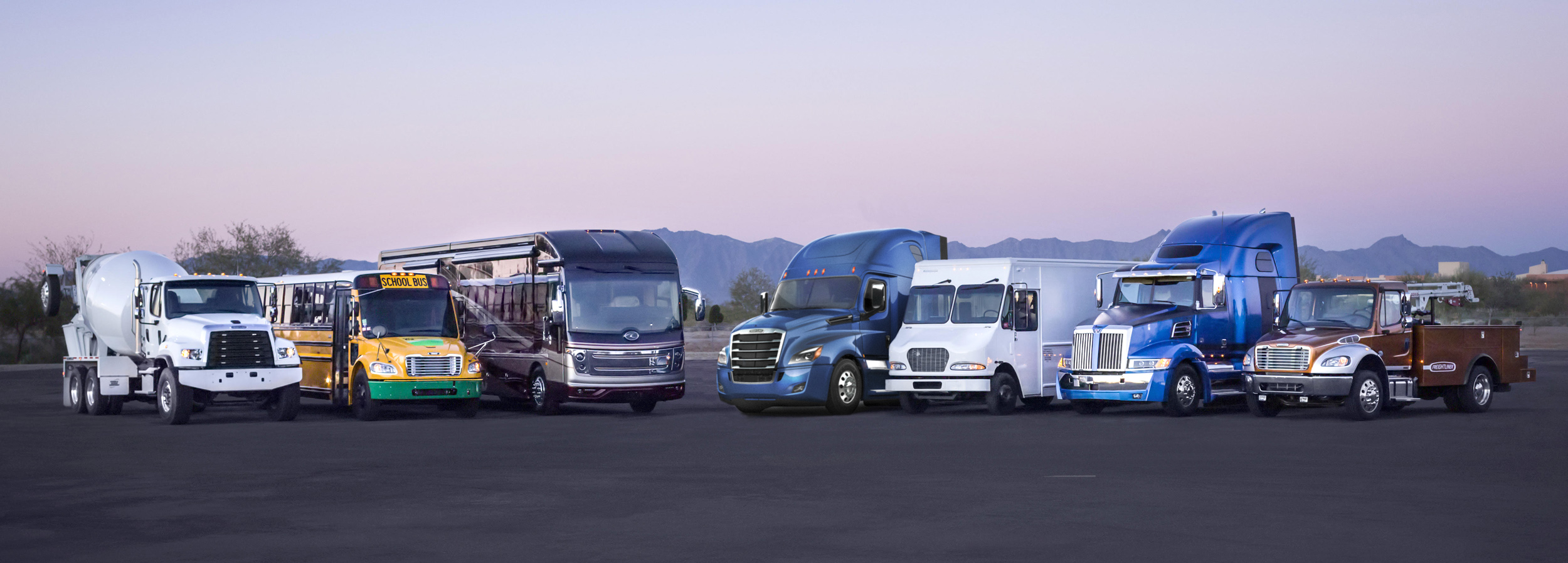- Uncover why Daimler halts diesel sales in Oregon, signaling a major shift in commercial vehicle compliance.
- Learn how the state’s Advanced Clean Trucks rule impacts OEM strategies amid uncertain emission credits.
- Discover what Mack and Volvo are doing to adapt their diesel truck offerings to zero-emission mandates.
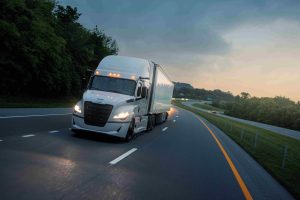
Oregon’s emissions credits system aims to ease the zero-emission transition but leaves manufacturers grappling with compliance uncertainty.
Daimler halts diesel sales in Oregon, citing complexities in the state’s Advanced Clean Trucks rule and uncertainty around emission credits allocation. As a result, Daimler Diesel Truck Sales have come to a standstill, prompting questions about how zero-emission mandates and Oregon trucking regulations will evolve. Below, we explore the reasons behind this pause, reactions from industry competitors, additional insights into regulatory distinctions between Oregon and California, and the potential long-term impacts on commercial vehicle compliance.
Daimler Halts Diesel Sales: How Oregon Trucking Regulations Affect Daimler’s Decision
Oregon’s Department of Environmental Quality (DEQ) has adopted a version of the Advanced Clean Trucks rule that differs from California’s approach. These differences lie mainly in how emissions credits are calculated and tracked, creating what Daimler views as unpredictable compliance requirements.
For more news and updates on DTNA, check out this page.
- Uncertain Emission Credits: The core challenge for Daimler revolves around how many credits they can earn (and must use) for each vehicle type. This unpredictability directly affects the company’s ability to forecast production and inventory for ICE trucks.
- Potential Penalties: If manufacturers fail to meet the mandated zero-emission quotas, they could face steep fines or be forced to trade credits with other OEMs at unfavorable rates. Daimler’s temporary sales halt reflects its desire to avoid these financial risks.
What Is the Advanced Clean Trucks Rule?
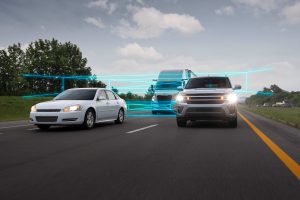
Allowing credits for near zero-emission models widens the path to meeting Oregon’s targets, yet complicates traditional diesel truck strategies.
The Advanced Clean Trucks rule obligates truck manufacturers to sell an increasing percentage of zero-emission vehicles each year. While it shares a similar goal with California’s version—reducing greenhouse gas emissions—it has unique provisions in Oregon that complicate compliance for OEMs.
Enjoying our insights?
Subscribe to our newsletter to keep up with the latest industry trends and developments.
Stay InformedStay abreast of the latest developments shaping regulations in the trucking sector, click here.
- Credit-Based System: Manufacturers earn credits from selling zero- or low-emission models. These credits offset or reduce the number of combustion-engine vehicles they can sell.
- Ramping Up Requirements: Over time, the percentage of new trucks that must be zero-emission rises, placing growing pressure on OEMs.
- Infrastructure Gaps: Although the rule aims to accelerate EV adoption, the trucking sector cites inadequate charging networks and a lack of proven long-haul solutions as pressing obstacles.
Regulatory Context: Key Differences Between Oregon and California
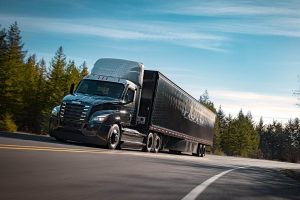
Infrastructure gaps in rural corridors remain a formidable challenge to large-scale electric truck adoption.
Oregon largely follows California’s lead on Advanced Clean Trucks (ACT) but has introduced notable modifications that affect compliance:
- Early ZEV Credit Flexibility:
“Oregon allows credits from early zero-emission vehicle (ZEV) sales, starting in 2022, to be applied in future compliance years. This banking system is designed to encourage earlier adoption while providing manufacturers a way to offset potential deficits later.”
- Near Zero-Emission Credits:
“Unlike California, Oregon permits credits from certain near zero-emission vehicles, such as plug-in hybrids, broadening the pathways to compliance.”
- Extended Compliance Period:
“Oregon offers manufacturers an additional three years for initial sales targets, aiming to address the practical challenges of ramping up ZEV production.”
These distinctions reflect Oregon’s intent to ease the transition for manufacturers by providing additional flexibility. However, DTNA has found that, in practice, these credit variations create uncertainty in projecting the total number of diesel vehicles they can sell without risking non-compliance.
Find more on Oregon’s DEQ and its regulations, explore this link.
Are Competitors Following Suit?
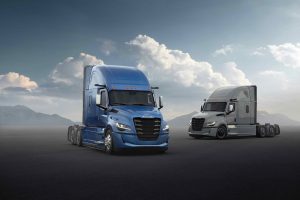
Early zero-emission vehicle credits encourage swift adoption, yet raise questions about long-term feasibility for heavy-duty fleets.
While Daimler has opted to halt diesel truck sales entirely, Mack Trucks and Volvo Trucks have merely placed limits on ICE orders in Oregon. They aim to retain some level of diesel market presence but are also balancing zero-emission mandates and credit requirements:
- Mack Trucks: Mack has expressed concern that low demand for electric vehicles in Oregon constrains the number of diesel units they can offer without risking non-compliance.
- Volvo Trucks: Volvo continues to sell diesel options in Oregon, but it actively encourages potential buyers to consider battery electric vehicles.
For additional insights into diesel fuel and its role in commercial trucking, explore this page.
How Does This Affect Daimler Diesel Truck Sales?
Daimler Diesel Truck Sales remain on hold in Oregon until the company gains clarity on credit calculations and compliance thresholds. During this pause, trucking fleets seeking diesel units may look to other OEMs for solutions:
- Operational Uncertainty: Fleets that traditionally rely on Daimler’s vehicles might delay upgrades or expansions, waiting for the regulatory fog to clear.
- Potential Market Shift: Dealers could pivot to promoting electric or other zero-emission models sooner than planned, accelerating the broader electric truck transition.
Oregon Market Impact: Effects on Dealerships and Fleets
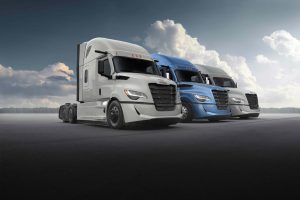
Daimler’s decision to pause diesel truck orders underscores the high stakes of navigating evolving emissions rules.
The pause in diesel truck sales by Daimler Truck North America could create significant ripples in the Oregon market:
- Dealership Inventory Changes: Many dealerships that typically stock a high volume of Daimler diesel trucks may see inventory shortages, prompting them to diversify into electric or near zero-emission vehicles to maintain sales and meet compliance.
- Shift in Fleet Buying Behavior: Fleets reliant on diesel might explore alternative suppliers or accelerate investments in ZEVs to avoid supply gaps. The availability of financial incentives, alongside evolving charging infrastructure, could further drive interest in electric trucks.
- Potential for Increased Costs: Reduced diesel availability may boost prices for the remaining stock, temporarily raising acquisition costs. Meanwhile, transitioning to electric trucks can be expensive upfront, though lower operating costs may balance out the investment over time.
- Strategic Industry Shifts: Daimler’s competitors could capitalize on this pause by stepping in with diesel or advanced electric offerings. Over the longer term, this may accelerate market-wide electrification, with OEMs rethinking their product lineups and compliance strategies.
To dive deeper into the topic of electric trucks and their impact on fleet operations, follow this link.
Key Questions from Fleet Operators
Below are several frequently asked questions by fleet operators and trucking industry professionals:
- “When will Daimler resume diesel sales in Oregon?”
“We have no confirmed timeline yet. Daimler is working closely with the state’s DEQ to resolve the emissions credits ambiguity.”
- “Do zero-emission mandates cover all truck classes?”
“Generally, the Advanced Clean Trucks rule applies to medium- and heavy-duty vehicles, but specifics vary by region, reinforcing the need to follow state-by-state regulations.”
- “Will Oregon’s trucking infrastructure support rapid EV adoption?”
“Many fleets find the charging infrastructure insufficient, particularly in remote or high-traffic corridors. This gap could slow the shift away from diesel.”
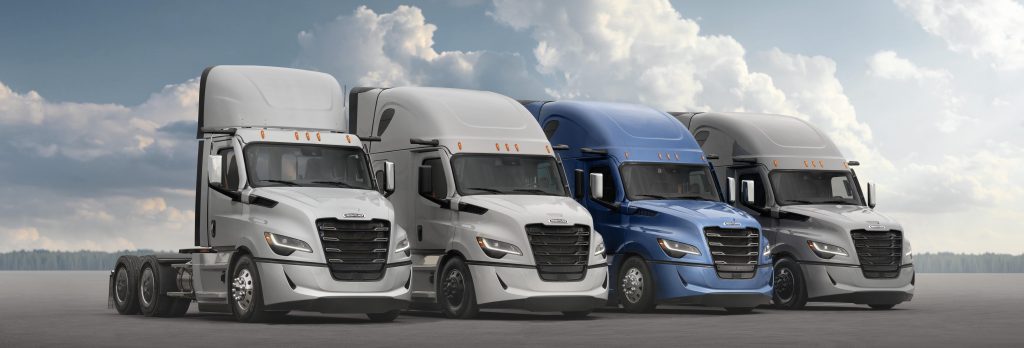
Resuming diesel sales hinges on Oregon DEQ clarifying how electric truck credits are counted and applied.
Daimler-DEQ Timeline & Next Steps
Effective January 1, 2025, Oregon’s DEQ mandates that 7% of new Class 8 heavy trucks sold by manufacturers must be electric-powered. Daimler’s chief concern lies in how credits for electric trucks are counted, fearing non-compliance or potential penalties if credit allocations don’t align with internal forecasts.
- Ongoing Discussions: Currently, DTNA and Oregon’s DEQ are negotiating a clearer credits system. Daimler is seeking assurance that Oregon’s approach aligns more closely with California’s model to reduce forecasting uncertainty.
- Resuming Diesel Sales: While no firm date has been announced, a successful resolution could see Daimler lifting its diesel sales pause. Dealers anticipate that any agreement will outline a predictable and transparent credit calculation process.
- Industry-Wide Pressure: The resolution of Daimler’s concerns may set a precedent for other OEMs considering how to manage compliance in states with similar regulations.
Explore our news on factors influencing growth and challenges for HD truck manufacturers, visit this link.
Infrastructure Challenges Loom Large
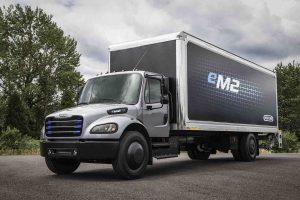
Early zero-emission vehicle credits encourage swift adoption, yet raise questions about long-term feasibility for heavy-duty fleets.
Even if the regulatory dust settles, practical hurdles remain. Battery electric vehicles used in commercial settings require reliable, high-capacity charging stations that are often scarce along long-haul routes:
- Rural Oregon Coverage: Extended stretches of roadway lack charging facilities, making it risky for fleets to rely solely on battery-powered trucks.
- Multi-State Coordination: Many freight routes pass through multiple states. Without consistent infrastructure policies, electric truck adoption remains patchwork at best.
The Road Ahead: Balancing Innovation and Compliance
Stricter emission laws are reshaping the trucking landscape. While OEMs respect environmental goals, they also face real-world constraints tied to infrastructure, technology costs, and market readiness. Daimler Diesel Truck Sales, paused for now, might resume once the emission credits system in Oregon becomes more predictable. Until then, Oregon’s actions may serve as a bellwether for how other states implement or adjust their own regulations.
For more news and updates on Freightliner and its latest initiatives in heavy trucking, check out this page.
Synopsis: Daimler’s Oregon Diesel Sales Halt Shapes Zero-Emission Landscape
Daimler Halts Diesel Sales in Oregon due to concerns over the Advanced Clean Trucks rule, but the broader question is how this regulatory shift will accelerate zero-emission mandates across the country. Daimler Diesel Truck Sales remain the focal point in a rapidly evolving market—one marked by ambitious environmental targets and equally significant infrastructure challenges.

Heightened regulatory pressures and uncertain timelines push manufacturers to rethink both diesel and electric investment.
The recent move underscores the pivotal role of state-level regulations in shaping national freight and transportation trends. While Oregon’s adaptation of the Advanced Clean Trucks rule mirrors California’s approach in many respects, subtle differences in credit calculations and compliance timetables have created new layers of uncertainty for manufacturers. This pause in diesel truck sales highlights just how sensitive the industry is to evolving emissions standards, particularly when manufacturers are unsure how to accurately forecast their credit balances and avoid non-compliance penalties.
Beyond this immediate pause, the industry is also grappling with how best to scale electric truck production, develop adequate charging infrastructure, and manage the higher upfront costs of zero-emission vehicles. As the public and regulators push for cleaner transportation, Daimler’s halt may prove a tipping point for accelerating the shift to battery electric and near zero-emission trucks. Industry observers anticipate that Oregon’s stance—and Daimler’s subsequent reaction—will influence how other states roll out similar mandates, signaling broader changes that could redefine America’s commercial vehicle landscape for years to come, especially in Oregon.
Stay updated on the latest trends in zero-emissions initiatives across the industry, check out this link.
Key Developments on Daimler Halts Diesel Sales in Oregon
- Daimler has fully paused diesel truck orders in Oregon due to unpredictable emission credits under the new rule.
- Mack and Volvo continue to sell diesel but have imposed strict limits to maintain compliance with zero-emission quotas.
- Regulatory nuances in Oregon, including credit-banking and extended timelines, aim to ease the transition yet create complexity for OEMs.
- Infrastructure gaps and state-specific credit calculations remain a major challenge for fleets transitioning to electric trucks.
- Dealership inventories and fleet-buying behaviors are shifting toward electric or hybrid options in response to these constraints.
- Ongoing discussions between DTNA and the Oregon DEQ could provide clarity on credit systems and pave the way for diesel sales to resume.
Additional External Insights and References
- For a closer look at how Oregon’s new electric truck rule is affecting local transportation, explore this article by Willamette Week.
- To understand Oregon’s Advanced Clean Trucks Rule directly from state documentation, review the Oregon DEQ’s official forum notes.
- For further details on California’s version of the Advanced Clean Trucks regulation and its objectives, visit the ICCT’s resource.
- Learn more about Daimler’s decision to stop selling diesel-powered semi trucks in Oregon, read the report on CDL Life.
- For additional context on Oregon’s Advanced Clean Trucks regulations, check out this overview from the SDAO.
- Stay informed on Daimler’s ongoing discussions with Oregon DEQ over diesel truck sales, review OPB’s coverage.

